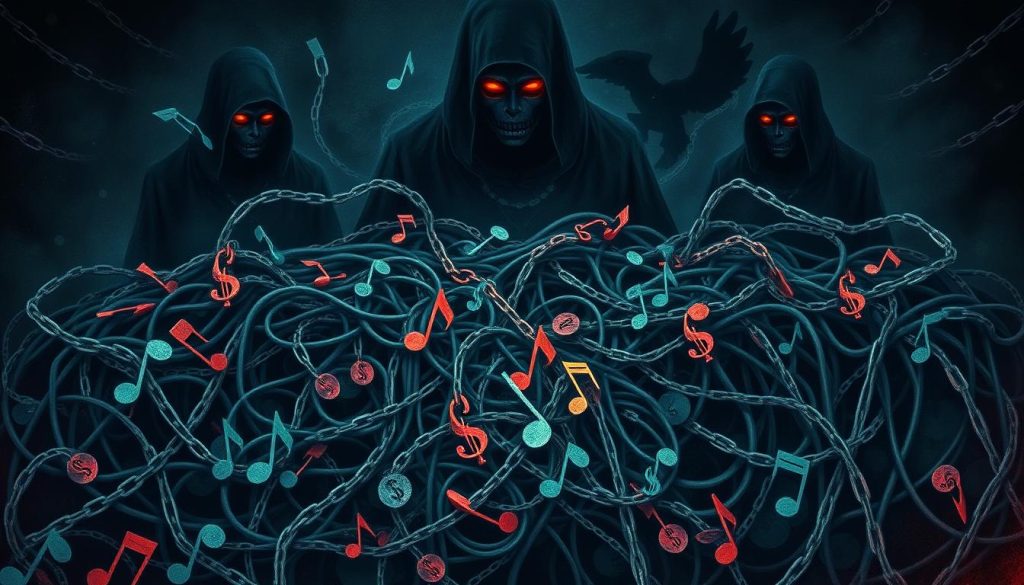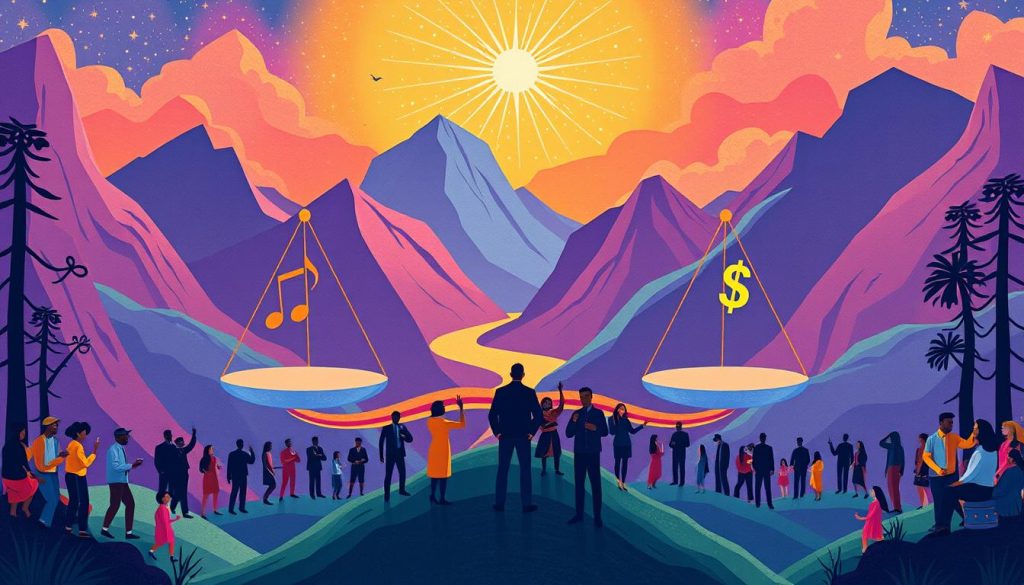The music industry is changing fast, and many are worried about the secrets behind music streaming. Artists and experts are asking if these services really help the people who make the music. They look at how algorithms, privacy, and money are handled.
A big case in North Carolina has brought up dark sides of music streaming1. A musician was accused of using fake accounts and AI songs to get millions. This case shows how the system can be broken and how artists might not get paid fairly.
The fight over music streaming is getting louder. There are many issues, like unfair algorithms and big companies controlling everything. People worry about their privacy and if their music is being censored. These problems could hurt the artists who keep the industry alive2.
Key Takeaways
- Music streaming platforms are facing growing scrutiny over their opaque practices and potential conspiracies.
- Recent high-profile cases have exposed vulnerabilities in the system, raising concerns about the integrity of streaming data and fair artist compensation.
- Allegations of algorithm bias, monopolistic practices, and concerns over data privacy and content censorship have fueled the ongoing debate.
- The music streaming landscape is complex and contentious, with the potential to undermine the very artists whose work sustains the industry.
- Understanding the nuances of this issue is crucial for artists, industry professionals, and music lovers alike.
The Rise of Music Streaming and the Controversy Behind It
The music industry has changed a lot in recent years. Music streaming services like Spotify, Apple Music, and Amazon Music are now the main way people listen to music. In 2021, global streaming revenue hit over $30 billion3. But, this fast growth has also caused a lot of controversy and criticism from artists and industry watchers.
Exploring the Growth of Music Streaming Platforms
Spotify, the top music streaming service, has around 600 million listeners3. Its algorithms, like “Smart Shuffle” and “Discover Weekly,” are getting better at finding music you’ll like3. This has helped artists like Sabrina Carpenter become more popular, with songs like “Espresso” being hits3.
Allegations of Artists Being Underpaid and Kept in Debt
Despite the growth, there’s a big issue with how much artists get paid. Many say streaming services don’t pay them enough and keep them in debt4. Spotify’s algorithms have been criticized for favoring well-known songs and artists, known as the “Matthew Effect.”3 This makes people worry about the fairness and future of the music streaming business.
Record labels are also under scrutiny. Some think their close ties to streaming platforms, like Universal Music’s stake in Spotify, might affect who gets promoted4. The rise of AI music and fake streaming activities, like Michael Smith’s case, have also raised concerns about fairness and transparency in the industry5.
The music streaming world is still changing. The debate over fair pay for artists, the role of algorithms, and the effects of new tech like AI will keep being big issues for a while.
The Music Streaming Conspiracy Unveiled
The case against North Carolina musician MICHAEL SMITH has brought to light the dark side of music streaming. He’s accused of using bots and AI to fake streaming numbers, earning over $10 million in royalties fraudulently6. This highlights the need for more transparency in how streaming platforms pay artists and choose what music to play.
SMITH, 52, from Cornelius, North Carolina, faces serious charges. He’s accused of wire fraud conspiracy, wire fraud, and money laundering conspiracy, each carrying up to 20 years in prison6.
SMITH planned to use bots to get about 661,440 streams daily, earning $1,207,128 a year6. His AI songs were streamed billions of times, earning him over $10 million in royalties illegally6. This scheme lasted from 2017 to 2024, manipulating billions of streams for illegal gains7.
The music industry has faced many conspiracy theories over the years. The “27 Club” and claims of record labels controlling artists are just a few examples8. The SMITH case adds fuel to the debate about fairness and fraud in music streaming.
The industry must now focus on transparency, fair pay, and oversight of streaming platforms. The SMITH case is a warning for the music world to protect artists’ rights and ensure fair compensation.
music streaming conspiracy: Dissecting the Algorithms and Biases
The music streaming algorithms are under close watch. People worry they might unfairly affect artist earnings and what music gets played. These algorithms, often hard to understand, might favor some artists or music types over others. This could limit the variety in the music world9.
Examining the Algorithms that Determine Artist Payouts
Looking closely at these algorithms shows a complex and debated area. Even though platforms say they focus on user happiness and fairness, the truth is different. The systems deciding how much artists get paid can be influenced by many things, not just how popular the music is9.
This has raised worries that the system might be unfair. Some artists or labels might get more money because of their size or influence.
Exploring Potential Biases and Monopolistic Practices
The mystery around these algorithms has led to suspicions of unfairness and control in the music streaming world10. Research shows that how search engines work can shape people’s views and feelings10. This makes people think similar tricks might be happening in music streaming10.
Also, the music industry is getting more concentrated, making it harder for new artists and small labels to be heard9.
As music streaming grows, it’s key for the industry to tackle these problems. The algorithms need to be clear, fair, and work for both artists and listeners. This way, music streaming can reach its true potential.
Protecting Artists’ Rights and Fair Compensation
The music streaming industry is growing fast. But artists are not getting fair pay. They are often stuck in “eternal debt” because of low royalty payments. This has led to calls for better rules and changes in the industry11.
There’s a big problem with how streaming platforms pay artists. The way they decide payouts is not clear. This has led to accusations of unfair treatment, especially against new or independent artists12.
- Artists make very little from streaming music. They might get as little as $0.0009 per play, depending on their contract12.
- Only 43,000 artists on Spotify account for 90% of all streams. This shows a huge gap12.
- Major labels make more money, but artists get less. This shows how the industry favors big labels over artists12.
Some people think changing how payouts are made could help. They suggest using a model where artists get paid based on who their fans are. This could make things more fair for everyone12.
| Metric | Current Pro-Rata System | Proposed User-Centric Model |
|---|---|---|
| Artist Royalty Distribution | Based on overall platform streams | Based on individual listener’s streaming habits |
| Potential Impact | Favors larger, more popular artists | Could lead to more equitable distribution for lesser-known artists |
There are also efforts to protect artists from unfair practices. This includes making sure they get credit for their work and stopping unauthorized use11. A petition called “Justice at Spotify” wants to increase what artists get paid per stream to one cent. It has thousands of musician signatures13.
The fight for fair pay and rights in the streaming industry is ongoing. It will shape the future of music111213.
Conclusion
The music streaming world is facing many issues. These include unfair pay for artists, biased algorithms, and possible monopolies. As the industry grows, it’s clear we need more openness, responsibility, and change. This is to make sure music stays fair and good for everyone.
Music streaming has changed how we listen to music. But, there are big problems like fake royalty payments14. Services like Spotify have also been accused of breaking copyright laws and not paying artists enough15. This shows we need better rules and fair pay for artists.
Now, artists, industry leaders, and lawmakers must work together3. With Spotify having over 600 million listeners and the music world growing, it’s time for change. We need to make sure the music streaming industry, artist compensation, and industry reform work for everyone. Only by working together can the music world flourish in the digital age.
FAQ
What is the music streaming conspiracy?
How has the growth of music streaming platforms impacted the industry?
What are the concerns surrounding the algorithms used by streaming platforms?
What are the potential monopolistic practices within the music streaming industry?
What efforts are being made to ensure fair compensation for artists?
Source Links
- QAnon, authoritarianism, and conspiracy within American alternative spiritual spaces
- The Spotify conspiracy theories about “Espresso,” explained
- Sabrina Carpenter and Spotify conspiracy theories
- Musician charged with using bots to boost streaming revenue
- North Carolina Musician Charged With Music Streaming Fraud Aided By Artificial Intelligence
- Man accused of using AI to create and stream millions of songs in $10M royalty scam | The Express Tribune
- Unveiling the Enigma: Top 3 Conspiracy Theories of the Music Industry
- DOWNSTREAMING
- The Answer Bot Effect (ABE): A powerful new form of influence made possible by intelligent personal assistants and search engines
- On Copyright, Creativity, and Compensation
- Why Streaming Doesn’t Pay – ProMarket
- The Missed Opportunity of the Spotify Boycott
- North Carolina Musician Charged With AI Assisted Music Streaming Fraud
- Spotify just won a long-running lawsuit over streaming of Eminem’s catalog – despite the court finding it didn’t have a license for the music. What does this mean for publishers? – Music Business Worldwide



